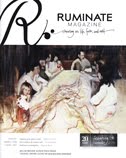Beloit Poetry Journal – Fall 2011
Notwithstanding Lee Sharkey’s essay/review on the poets Kazim Ali and Brian Teare, this entire volume of BPJ features just one poet, Michael Broek—more precisely, his series of thirty poems titled The Logic of Yoo. Reading the collection is a transforming experience. The series tackles the problem of violence in modern history. The problem is approached without preaching or thundering. A protagonist—a doctoral student—researches the topic, not because he is passionate about it or wants to rid the world of violence, but because he is paid for his work. Masterful irony reverberates in the laconism of the student’s research notes, in his quoting factual documents, and in evoking authentic objects, places, and persons. Continue reading “Beloit Poetry Journal – Fall 2011”

